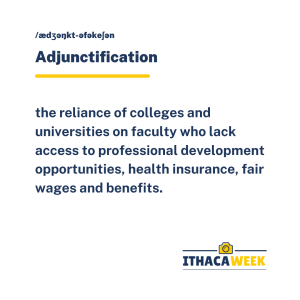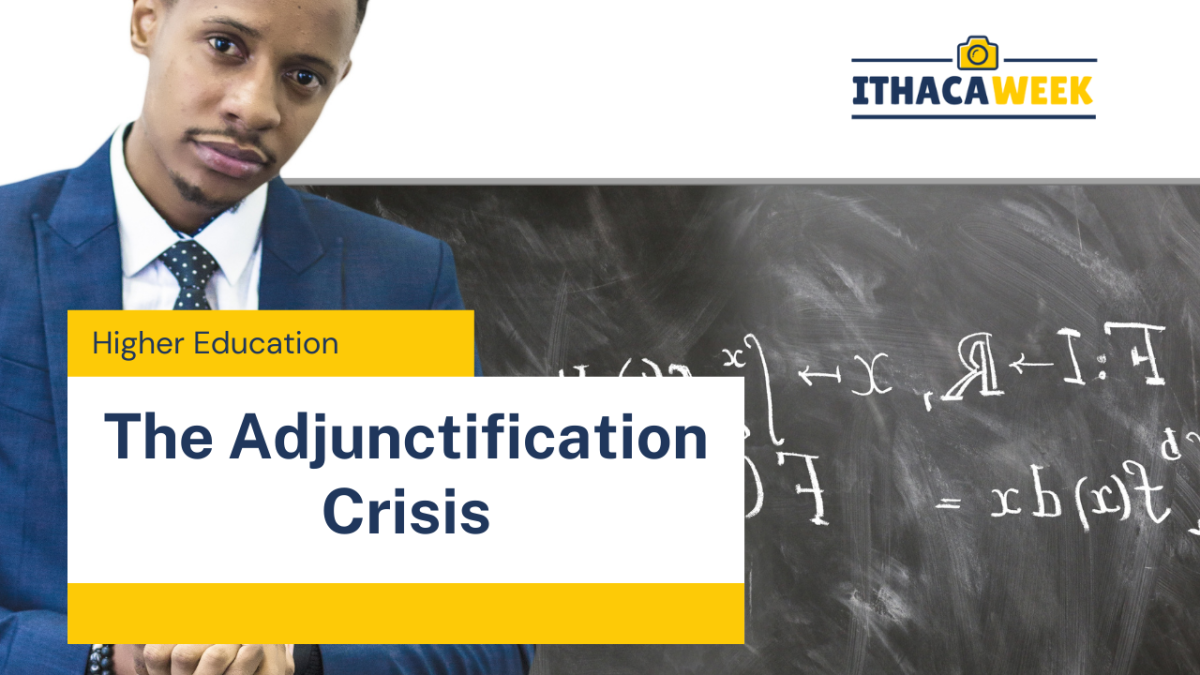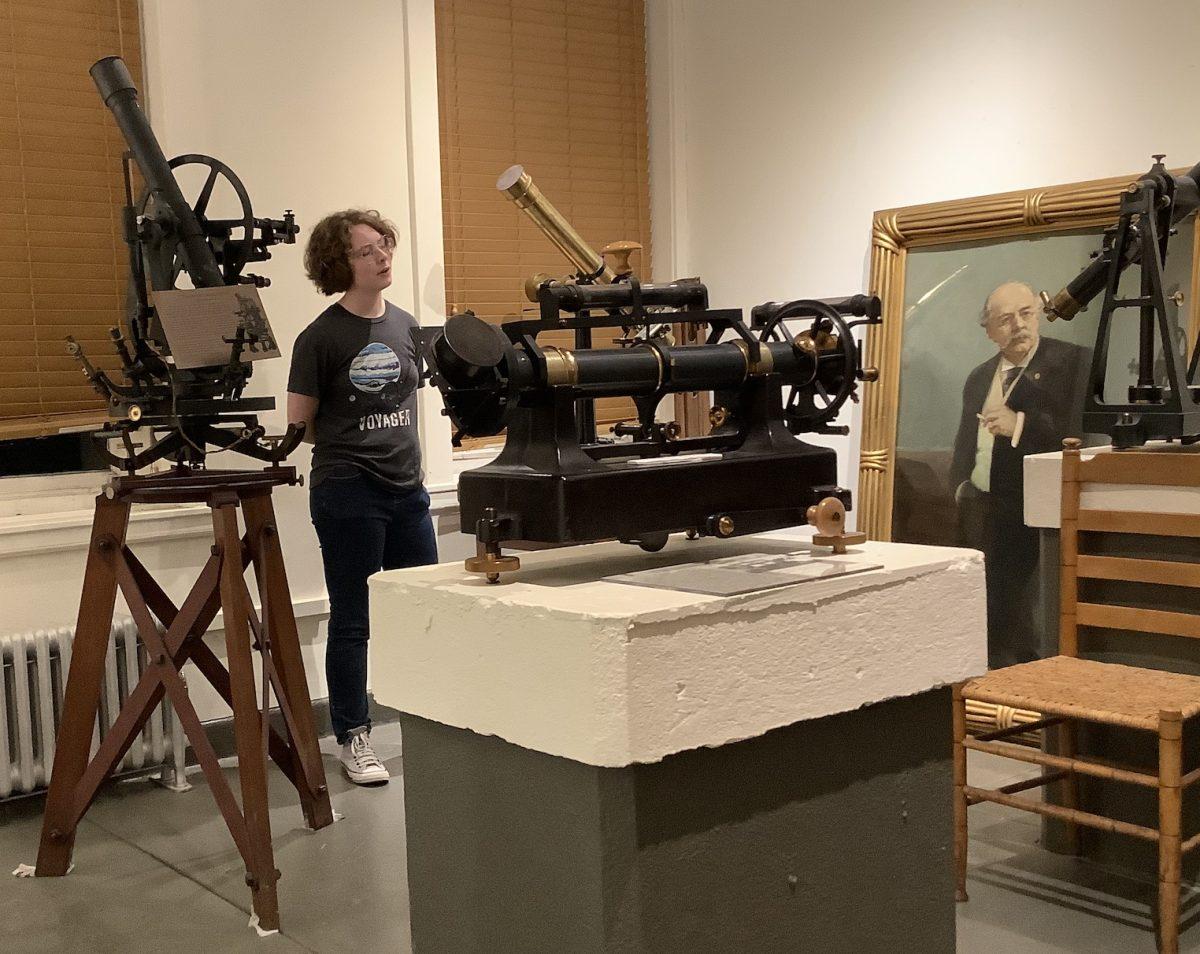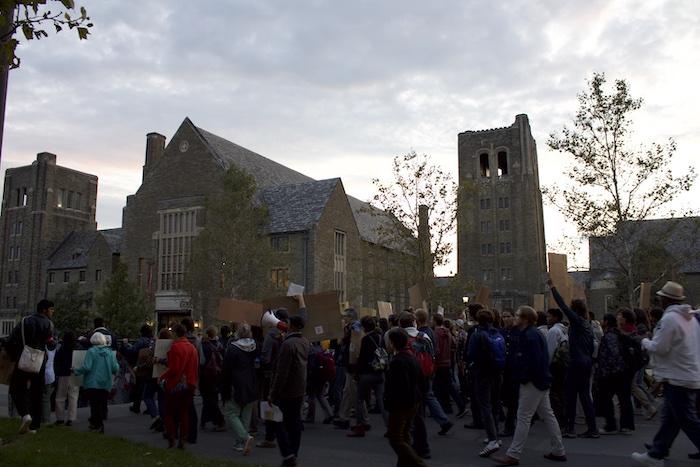Rachel Fomalhaut, current steward and former chair of the IC Contingent Faculty Union, has been a part-time professor at Ithaca College for 10 years. For much of her academic career, she taught a full-time course load across multiple schools.
In February 2021, the Academic Program Prioritization Implementation Committee (APPIC) announced that it would be eliminating 116 full-time-equivalent positions (FTE), citing the so-called “enrollment cliff” and a need for long-term, fiscal sustainability.
Fomalhaut was one of many professors who the College laid off as a result of the Academic Program Prioritization (APP) process.
“Ithaca College (like other colleges) [has] blatantly exploited the adjunct loophole… of employment in order to get out of paying faculty a fair wage… [providing] faculty benefits, and also to, you know, get out of giving tenure to faculty,” Fomalhaut said.

The College also laid off Dr. Kathryn Caldwell, associate professor in the Department of Psychology at Ithaca College. She explained that contingent faculty positions are tied to enrollment.
“I’ve always known that enrollments and my job were tied together because of being in a non-tenure-line position, and that is something that is made pretty clear in the paperwork,” Caldwell told The Ithaca Voice last year.
After the Spring 2022 semester, Fomalhaut, Caldwell and countless others will not have a position at the College.
The Adjunct Loophole
For-profit institutions across the United States have been heavily dependent on adjunct and contingent faculty for decades, giving rise to adjunctification.
What began as a way for professionals to serve their community quickly became a vehicle for institutional exploitation when colleges and universities realized that they could benefit their own bottom line by denying academic workers adequate working conditions.
“Campuses that fail to do right by non-tenure-track faculty are falling into the performative trap of ‘doing’ diversity, equity, and inclusion,” Jordan Harper, research assistant at the Pullias Center for Higher Education at the University of Southern California, said. “In many ways, they’re committing to a neoliberal fashion of diversity, equity, and inclusion that is only concerned with the ‘bottom line’ or return on investment (ROI) and using people as props to maintain legitimacy in the public sphere.”
Non-tenure-stream faculty are also at a greater risk of losing both their jobs and their right to academic freedom.
“Higher education’s reliance on non-tenure-track faculty exposes the ways neoliberalism—and particularly notions of control and gig labor—has become the animating feature of higher education as we know it,” Harper said. “We must remember that many non-tenure-track faculty members lack equitable and even livable working and living conditions.”
Instead of adding tenure-track lines, institutions opted to expand their reliance on what has been dubbed the “de facto underclass” of the academy. Fomalhaut said that this has resulted in a largely transient faculty base.
“It really is sort of like a ghetto because… a lot of schools adopt this sort of two-track mindset, where they invest somewhat at least in… their tenure track professors… particularly in the folks that they relegate to this like ghetto track of contingency,” Fomalhaut said. “IC laid off tons of its contingent faculty last year, and that was something that they could do only because we didn’t have those protections that tenured faculty have.”
Teacher working conditions are student learning conditions. Always and forever. https://t.co/dygZvR5WuI
— Kevin Gannon (@TheTattooedProf) June 5, 2021
More than 70 percent of faculty at colleges and universities nationwide are not tenure-track, according to a 2018 report by the American Association of University Professors (AAUP). By trying to do more with less, the academy is treating the majority of faculty as disposable and dampening educational quality across the United States.
Unlike tenured and tenure-track faculty, adjuncts and contingents often lack institutional backing for professional development opportunities and scholarship, among other things.
“It is actually necessary and important for students to have permanently placed well-resourced teachers, but schools are just disregarding that need from students and instead, hiring teachers so that they’re placed in a really transient way and not supported to have the same resources that students need them to have,” Fomalhaut said.

“People aren’t resourced well enough to live their lives, let alone do their jobs… in a supportive way as the folks who are being paid well teaching right next door,” she continued. “When faculty are scrambling to pay their bills and having to teach you know, a full-time load spread out across many miles and multiple schools, it’s very stressful and it takes away time from students.”
Reversing Adjunctification
Although tenured and tenure-track faculty have better working conditions than their adjunct and contingent counterparts, there is also a distinction to be made between the latter two groups of academic workers.
While adjuncts tend to be hired by colleges and universities in the spur of the moment contingents are typically on short-term contracts even if they teach at an institution for several years. Both groups lack adequate institutional support. As a result, they find themselves relegated to the aforementioned de facto academia underclass.

Geoff Johnson is the president of the American Federation of Teachers Adjunct Contingent Caucus. He released a statement on behalf of the AFT-ACC on Oct. 25, 2021, about the precariousness of the adjunct and contingent faculty roles, respectively, in higher education.
“In an equitable system of higher education, all instructors, on the basis of experience and education, would be paid equally or proportionate to the work they do, simply in that students themselves do not distinguish between a professor as an adjunct, contingent, or tenure-track faculty member, let alone understand the distinction. They would also have access to the same or proportionate healthcare and retirement benefits, and would be allowed and encouraged to participate in curricular development, shared governance, and other institutional matters. Further, they would after a proscribed time with satisfactory evaluations, enjoy an equal degree of job security to the fullest extent enrollment would allow it, and if in the event of loss of work, be afforded unemployment benefits.
Instead US higher ed, to save costs, pays adjunct/contingent faculty a fraction of what tenure-track make for the same work, sets workload limits within institutions and districts largely to avoid paying healthcare and retirement benefits, or simply denies these benefits altogether. They are more often than not further barred or discouraged from participating in curricular development, shared governance, and other institutional matters, and when there is exception to this, usually not compensated. Finally, as adjunct/contingent faculty work is defined as ‘temporary’ in nature, many states will deny unemployment benefits. Ironically, many of these ‘temporary’ faculty have been hired and fired on a term-by-term basis for decades, paying into a system from which they will never collect.”
Some attest that it is possible to transcend the structural factors that enable the exploitation of adjunct and contingent faculty.
“The status quo isn’t sustainable, but resolving this challenge will not be easy, especially in a context of highly constrained resources,” Steven Mintz, history professor at the University of Texas at Austin wrote in Inside Higher Ed. “But there is one principle that should inform any resolution: we need to treat all academic employees as the skilled professionals they are.”
For Fomalhaut, it has been troubling to witness both the lack of professional development opportunities for adjunct and contingent faculty and blatant displays of institutional exploitation.
“The school very explicitly leaves us out of, you know, professional development opportunities left and right,” Fomalhaut said. “There’s really not enough jobs that are decent, and so what a lot of folks end up doing like myself is like we stay in this… adjunct [underclass].”

Ithaca College is one of many frontlines where the effects of adjunctification are being felt.
“It’s a fight that we are seeing across campuses nationwide and non-tenure-track faculty are getting tired,” Harper said.
“Research has consistently shown that non-tenure-track faculty care deeply about teaching, learning, and building relationships with students,” he continued. “They deserve liveable wages and working conditions that will allow them to thrive in their pursuit of educating the next generation.”






